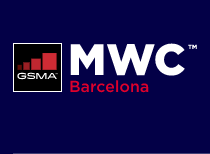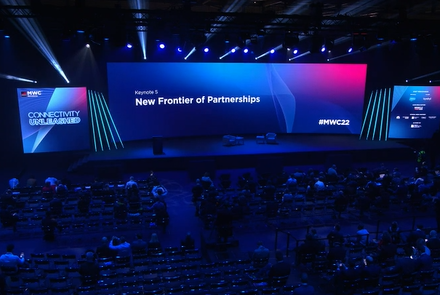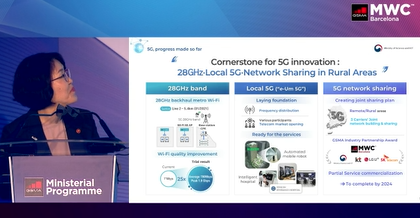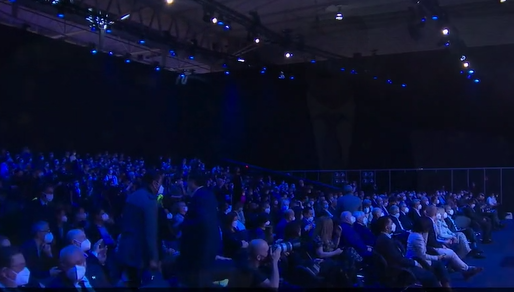The market – and the world — is changing as the next phase of technological evolution is “human centered, inclusive and sustainable.”
With that, it is the belief of the organizers of this week’s GSMA MWC Barcelona 2022 conference — the GSM Association’s flagship mobile industry and technology event — that high speed capacity networks, 5G and data-driven technologies like AI and IoT “underpin the transformation as companies across sectors look for digitally enabled and bespoke solutions.”
Among the companies actively seeking solutions are radio and TV broadcasters serving North American audiences.
And, that explains why FCC Chairwoman Jessica Rosenworcel is in the Catalonian metropolis Tuesday (3/1) to appear in the keynote session, “New Frontier of Partnerships.”
“The next generation of Telcos face untapped growth but must adopt a holistic approach to its transformation,” the GSM Association says. “Part of the blueprint is expanding collaboration and dialogue with other industries, as doing so will be better for business and offer connectivity solutions ready for the new era.”
 AI, ML … REINVENTING MEDIA
AI, ML … REINVENTING MEDIA
Joining Rosenworcel on the panel is Cristiano Amon, President/CEO of Qualcomm. Serving as the session moderator is The Wall Street Journal technology, media & telecom commercial sector journalist Sara Mascall. In her remarks, Mascall revealed that 5G and wireless technology advancements were key for WSJ journalists, as the publication takes an audience-first approach and consumes content “wherever, whenever.”
She noted, “It requires seamless data connections, and allows us to provide data-driven solutions from an editorial perspective.”
Perhaps one of the more startling session revelations came from Mascall, who shared that Artificial Intelligence and Machine Learning (ML) are being used by The Wall Street Journal for advertising alignment across its platform. In the case of AI, it is also being used in the newsroom, freeing up journalists to focus on big breaking news-type of stories — a chilling statement in a time when the Mercury News of San Jose, Calif., was skewered on the February 27 edition of CBS’s 60 Minutes for having what appears to be a 1-person newsroom. To others, AI is a reality of a greatly evolved news business — giving promise to both radio and TV to increase their news coverage while balancing staffing and expenses.
Following her short introductory remarks, Rosenworcel took the stage to talk about not only 5G, but “the next-next generation of wireless” — 6G. For Mascall, Rosenworcel is an individual who has had a “significant impact” on the technical revolution, one that began under former Chairman Tom Wheeler and propelled forward in a world without “net neutrality” under Rosenworcel’s predecessor, Ajit Pai.
For Rosenworcel, “Invention, innovation and imagination” served as the key themes of her prepared keynote address, delivered just before Noon, local time, on Tuesday. She noted that 5G communications networks are up and running in 112 countries, resulting in more than 95,000 5G deployments.
How do we go “deeper and further” with 5G deployment? Rosenworcel turned back to 1960, and the months before the election of John F. Kennedy as U.S. President. Then, Kennedy offered a call to action and a statement of belief to push the boundaries of technology to address the challenges of the world around us. This can be done again today, as Rosenworcel offered three ideas for a brighter wireless future.
First and foremost: freeing up more spectrum, especially in the mid-band airwaves. This, she said, is “key to delivering on the promise of 5G services.” Thus, 5G deployment must come at scale.
To accomplish this, spectrum auctions are Rosenworcel’s top priorities. She recalled the “successful” October 2021 prime mid-band spectrum auction, followed by the granting of some 5,600 C-Band licenses. Then came Rosenworcel’s “big reveal” — the U.S. will hold another spectrum auction, scheduled for July 2022, but this time in the 2.5 GHz band. She calls this auction offering “the single-largest swath” of mid-band spectrum we have for GHz.”
Rosenworcel’s move to more spectrum, in her view, also involves receiver improvements, tied to the next step in innovative spectrum management. This, she believes, aides in providing greater access to spectrum.
Lastly, on the subject of imagination, Rosenworcel touched on 6G, and how its development and future rollout is, like 5G, “matters for economic and national security” in the U.S. and globally.
PLENTY OF ELBOW ROOM
The midday session, which Rosenworcel did not participate in beyond delivering her prepared remarks, is perhaps the most relevant to radio and TV in the U.S. across the four-day event, which began Monday morning and concludes March 3. Many of the sessions are in-person only, although virtual and hybrid opportunities are being offered by conference organizers. Rosenworcel’s session was sparsely attended by in-person attendees.

A session held earlier in the day on Tuesday, including a “What’s Next for the Mobile Sector?” conversation that saw Republic of Korea Minister of Science and ICT H.E. Hyesook LIM offer a detailed overview of how “Korea’s 5G opened a new world,” was held in a small room with classroom-style desks attended by perhaps 50 in-person conference-goers.

While the thin in-person attendance on Tuesday morning may be a warning sign that upcoming events including the 2022 NAB Show in Las Vegas could yield disastrously low numbers, the return of the broadcasting industry’s biggest global show in late April cannot be fairly compared to MWC Barcelona. For the GSMA, extremely strict vaccination and face mask rules are in place. Then, there is the war in Ukraine, resulting in the removal of a Russian pavilion from MWC Barcelona.
But, it could not be disputed that the in-person crowd size on Tuesday declined dramatically from Monday, when MWC Barcelona opened.
THE ‘NEW TECH ORDER’
“Diversity4Tech” was a topic discussed as the conference opened Monday, at a 9:30am CET session on “transforming the workplace” that was perhaps the most well-attended of the keynotes thus far. With attendees all wearing high-grade KN95 face masks and no social distancing, the auditorium-style seats quickly filled as GSMA Director General Mats Granryd weaved his way through a conversation before individual presentations from the heads of Swedish company Telia, global giant Vodafone and Spain’s Telefonica. The session also included pre-recorded presentations, delivered in Mandarin, from China Mobile, China Telecom and China Unicom.
The FCC on January 27 revoked China Unicom’s authority to provide telecom services in the U.S. This decision came after the Commission in March 2021 found that China Unicom Americas “had failed to dispel serious concerns” regarding its retention of its authority to provide telecommunications services in the United States. This act came after the FCC ordered China Telecom (Americas) Corp. to discontinue any domestic or international telecommunications services within the U.S. by Jan. 3, 2022 “in light of potential security threats to the nation’s telecommunications infrastructure.” CTA offered consumers mobile service under the brand name “CTExcel,” as a Mobile Virtual Network Operator (MVNO).
The Commission in May 2019 denied China Mobile’s telecom services application.

Among the other MWC Barcelona sessions was a “ministerial programme” at 10am CET Monday turned its attention to digital inclusion and what it will take to get everyone connected.
Fintech and 5G session dominate the schedule, along with cybersecurity — a topic of particular importance given the Ukraine invasion by Russia and the threat of internet and IP attacks carried out by suspected Russia-based hackers.
In addition to the session featuring Rosenworcel, Tuesday’s sessions included an EsEt company spotlight on monetization and securitization of 5G and fiber networks.
An “ethical overview” of AI was a morning highlight.
For a look at the agenda for MWC Barcelona 2022 events on March 2-3, please click here.





